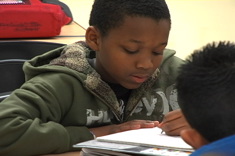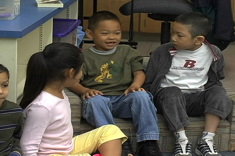To send a letter is a good way to go somewhere without moving anything but your heart.
Phyllis Theroux
We’ve found one of the most enjoyable ways to get to know others around us is the “Letters from Home” assignment. The task couldn’t be simpler – we solicit letters from family members or friends of those in our school community, asking them to help us understand the personality, quirks, and learning histories of their loved ones.
“Letters from Home” was developed by Ruth and her colleague, Kimberly Campbell. First used with interns in a graduate program, we’ve since tried the activity successfully with every age group from preschoolers to adults. We have learned an enormous amount about students, colleagues, and ourselves through these letters, and they help build some unique connections in the school community. Here is how “Letters from Home” works with different age groups.
Letters About Students
We begin by asking students to share our request with their family, thinking first about who knows them well as a learner and might be willing to write a letter. For example, Jessie Singer, a high school English teacher, sent this letter home with her ninth graders to share with family members:
Dear Family,
I told students today that I was going to give you some homework, too. I hope you will be willing to take on this assignment. If you need an extension, please let me know!
I would like for you to take a few moments to reflect upon your son or daughter as a unique individual and as a learner, and then write an informal letter to me about him or her. What are important things for me to know about your son or daughter? How does your son or daughter approach new challenges and tasks? Are there certain areas of academics that spark your child’s interests or tend to be more challenging? How can we best work together to help your son or daughter learn and grow this year?
I know my teaching must begin with building a community of learners with students. I hope to build a community which celebrates students’ individuality as well as our commonality. Each student brings a unique history, learning style, and set of interests and hopes to our classroom. I feel it is my job to weave these things into our community. You, as parents, play a crucial role in our classroom as well, through your support, your input, and your interest in what takes place daily in school.
Thank you for taking the time to share with me about your son or daughter. I look forward to reading your letter. Please return your letter with your child or put it in my box in the front office by Monday, September 10th.
Sincerely,
Jessie Singer
Here are some of the responses Jessie received to her request:
Dear Jessie Singer,
Re: Rosie
Rosie’s ability to keep her balance, feet firmly planted on the ground, through anything life has offered her since she was a small child has always astonished me. In fact, Rosie astonished me. I’ve learned enormous numbers of things from Rosie. She is warm and nurturing and calming to others. She is also comfortable taking a leadership position, and it seems her many friends often offer Rosie that position quickly and easily. She is very powerful and strongwilled. She is a true Leo, as am I. We butt up against each other at times.
Rosie is very independent about her school work. She rarely asks for help, but then again, academics never seem to me to be getting Rosie’s complete attention. She is a very fast learner. She taught herself keyboarding skills when she was a child, learned how to be a fine saxophonist (she’s in the high school symphonic band) and loves and dedicates a lot of extra-curricular time to dance. She’s an excellent performer.
My fear about Rosie is that she spreads herself too thin. She doesn’t focus on any one thing with complete focus, although dance gets a lot of her time. She’s very social and would prefer to be with others at all times. She loves to work in groups.
Rosie is also at the end of preparing for her bat mitzvah, which will be November 4. This was a totally Rosie-inspired decisions, and I’m sure it’s occupying a bit of mind right now.
Teachers always love Rosie. Giving her extra responsibilities.
Rosie’s da bomb,
Rosie’s Mom
And her Dad adds a whole letter, with these words to open:
To some degree, this all sounds a bit corny, but Rosie has always seemed to be an “old soul,” someone ahead of her years. It has been a joy for me being Rosie’s Dad. She has a good heart and a good head.
****************
Dear Ms. Singer,
Our son is Marc. He is a great kid but there are some things we can tell you that will help. He is very gregarious and that sometimes works against him (he talks too much!). He is an outstanding reader but only wants to read fantasy books except when forced. Reading has always been his favorite subject and math his least favorite. He is very easygoing and new challenges and tasks are not a problem for him. He is very excited about high school (especially the lunch break). His writing skills probably need some help (Too many run on sentences which he gets from his father. Can you tell who’s writing this?) He’s never been great at memorization but it hasn’t seemed to hinder him. He has a very good sense of humor and doesn’t take himself too seriously. His teachers have always said what a great kid he is and I know you will have a good time having him in your class this year.
Sincerely,
Marc’s mom
**************
Dear Ms. Singer,
Let me begin by giving you Brian’s most recent educational history.
We moved to Portland in September of last year. Brian has loved the many opportunities to do a variety of new things. Coming from a smaller town, he found the changes very exciting. He also had the opportunity to take a few classes last year at [this high school}, as his middle school limited him in a few areas.
As a learner, I believe that Brian likes a good challenge. If things become overly repetitive, he is apt to become bored, and at times surly.
Brian can be argumentative at times, so if there is a debate team, he would be wonderful on it.
Brian is a caring person. He would never intentionally hurt anyone.
I hope this will assist you in teaching Brian.
Sincerely,
Brian’s Mom
**********
To Ms. Singer,
I am Zhing-Le, sister of Zao-Ming. I can try to give you as many information about Zao-Ming. My sister is well learner. Most of the time she work hard in the class and outside of the class. She always completed her work and turn in the very next day. Zao-Ming want to have a lot of challenges. Challenges in Comp/Lit is not too hard for her since she enjoy writing and reading. She have good talent on every writing elements. She is very enthusiastic with new challenges and new lessons in your class. Her work and read process is grow quickly every time you giving her assignment. I haven’t had any other class with my sister, but I believe her fear is public speech. I hope this letter will help you understand my sister better.
Sincerely,
Zhing-Le
Letters About Colleagues
For colleagues or other adults, the letter is given first to them (usually on email), and then they choose what family member or friend they might want to forward it to for a response.
Here is an example of a note that might be given to a colleague. This letter was used by Brenda and Connie Perry, working together as a team to provide professional development to a local school. Mary was a new teacher:
Dear Mary,
With your help, we’d like to make an attempt to invite those close to you to give us some insights into what helps you learn and what special gifts you bring to our school community.
Please give the attached letter to someone in your family – significant other, son or daughter, mom or dad, close friend, roommate. We’d really appreciate hearing from someone who has known you for a long time, in a context outside of school. We will complete the same task, soliciting a letter from someone who knows us well to share with you. In this way, we’ll both get some new views of each other as learners as we continue to build our relationship this year. We’ll also get a sense of how it feels for learners of all ages to have family and friends share perspectives.
The letter you solicit will go directly to you, so that if you are uncomfortable with anything in it you can edit it, or not pass it on to us.
Thanks!
Brenda and Connie
Here is the letter Mary then passed on to her mother:
Hello:
Ideally, schools and families form a partnership, helping each other to create the best possible educational experience for every unique learner in the community. It’s what every parent wants for their children, what every teacher wants for the students in their classroom. The teachers at Maple Grove are also a community of learners, working together to discover the best ways to help each student in this environment reach their full potential. The more we know about any learner – their unique strengths, quirks, and history – the better the learning environment will be.
So, help us out here. Tell us what we should know about Mary and the way she approaches learning.
- What should we bear in mind?
- What hidden talents does she bring to our school?
- What are some tips you have about helping her grapple with new material or difficult situations?
Mary has recommended you as someone who knows her well, and might be willing to share some insights into her style as a learner, worker, and community member. We’d really appreciate it if you could take a few minutes and write a letter to us about what we need to know about Mary to tailor professional development to her needs. You can send the letter to Mary directly through regular mail or email, and she will pass it along to us. Thanks!
Brenda and Connie
Here is the response written by Mary’s mother, describing Mary’s history as a learner:
Dear Brenda and Connie:
What should you know about Mary? Having been voted the “class wit” in eighth grade, she has earned that reputation honestly. She is funny and finds it easy to laugh. Mary is casual and down-to-earth. She is easily touched by the gentle souls of the earth. She attaches to cute kids and old folks easily (she’ll want to take them home with her). She’s not as naïve as she was growing up as an only child and being protected by both parents. Sharing feelings and being able to recognize them in others is a strong attribute of hers. As a result of that, she is able to see through the insincerity of other people. As a child, she used to line up her dolls on the staircase and using her fingers as puppets create “her family” through role playing. Her strong family ties are very important to her. She loves her Gramps and keeps him supplied with “Big Bird” band-aids and chocolate chip cookies. She is poised, personable, and painfully neat (takes after her mother!). She has ethics and character (and is one too!).
It would be important to bear in mind that she is not afraid to confront issues and can get quite indignant about injustices. A hidden talent is her art in baking wonderful cookies. Another is her ability to impersonate. Her secret wish is to write children’s stories someday. She certainly has the talent to be her own illustrator, too.
Teaching and learning began at an early age for Mary. It was brought into focus after her kindergarten screening. She came home, climbed up on the kitchen table on her hands and knees and gave her Gramps a “peering and screaming” test (a.k.a. “Kindergarten Screening”) which, of course, he failed. Schoolwork was always a priority for Mary. She doesn’t mind hard work as long as “it makes sense.” She is a practical thinker. She never liked objective, standardized tests. She appreciates writing to show what she knows, and learns best through any kind of hands-on activity. She also needs time to process new information.
I hope what I have shared will help you get to know Mary better.
Forever Learning,
Christine [Mary’s Mom]
Letters from parents are often heartfelt. We’ve received glimpses of colleagues as children struggling to learn to play the piano, or dealing with their first poor grades from a stern teacher. In contrast, letters from friends and siblings are often brutally honest. Friends will warn you that the younger generation especially abhors any sort of hypocrisy – if we set high personal and professional standards in others, we must maintain them ourselves. We’ve been reminded of that fact repeatedly by the families and friends of novice teachers.
The letters we receive are always a powerful beginning for understanding the communities beyond the school. Even people who are wary about soliciting the letters usually treasure them once they are received. When we ask for letters from the family and friends of colleagues, we never make it a required task. People have complex personal histories, and we wouldn’t want the task to be perceived as an invasion of privacy. When the task is optional, we usually have a 85-90% return rate. We’ve shared the letters we’ve received from our family members and friends over the years, and the conversations about learning and literacy are instantly deeper and richer because of the stories and histories from beyond the school doors.
Helpful Hints
- Wait till you are past the first flurry of the school year to attempt the “Letters Home” activity.
- One or two weeks is plenty of time for a due date – longer than that, and the assignment can easily be forgotten or misplaced.
- It may be helpful to tie the assignment due date to a planned event for families, like Open House or family conferences.
- English language learners may prefer to have siblings write letters.
- Always solicit a letter about yourself from a family member or friend to share with your colleagues and students – you’ll be glad you did.







